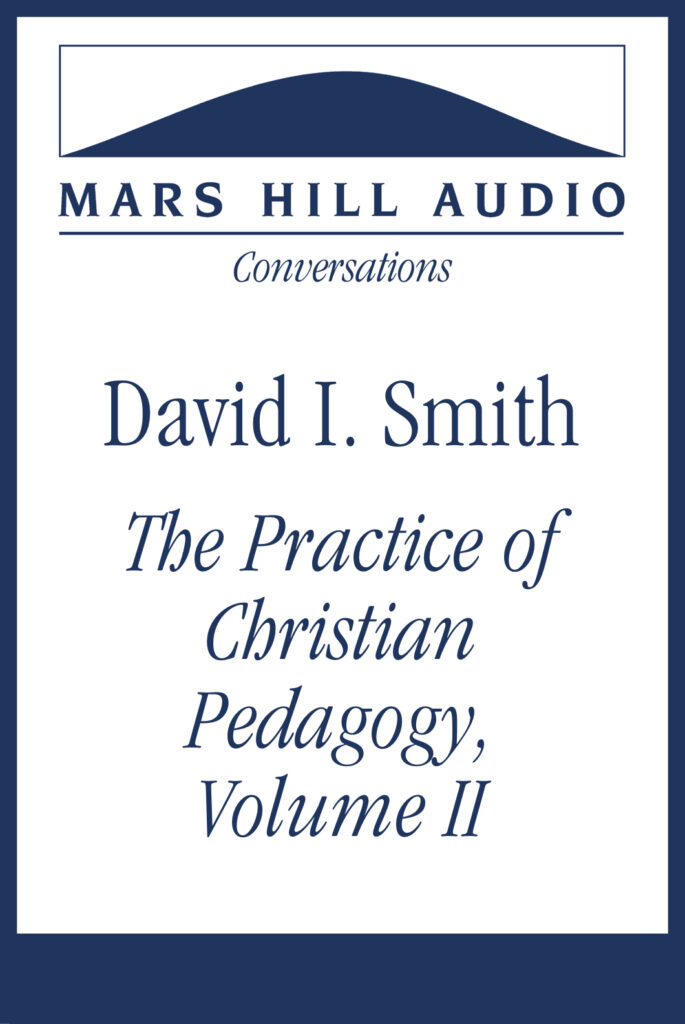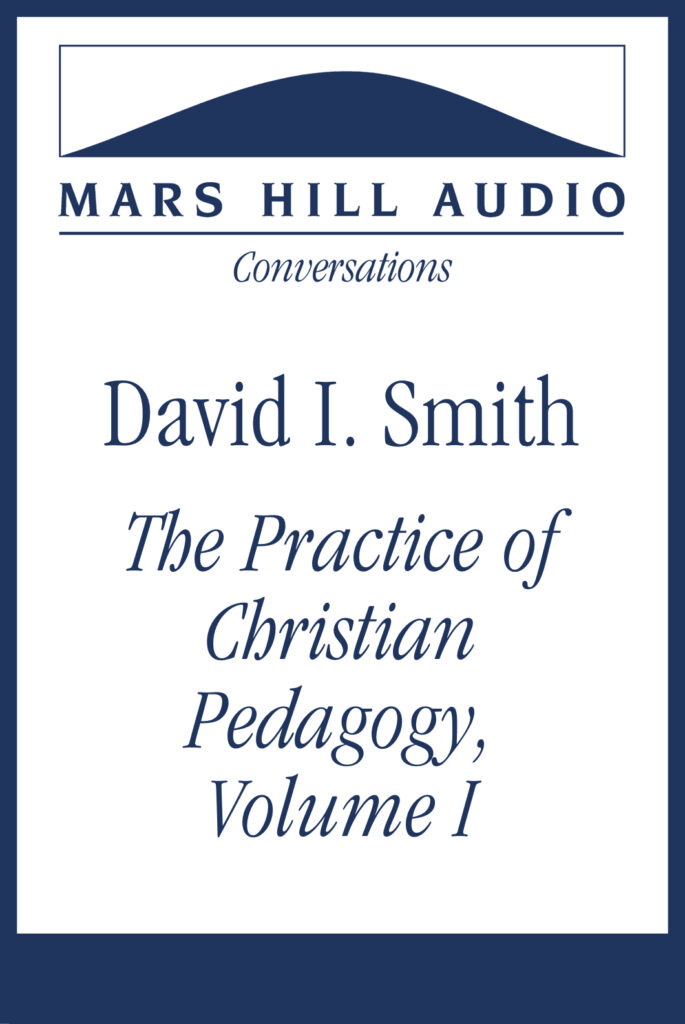released 1/28/2019
Language professor and pedagogue David I. Smith discusses in detail how practices in the classroom reinforce or contradict the goals of Christian teaching. The phrase “integration of faith and learning” has stimulated an abundance of scholarship on why faith and reason are compatible. It has also provoked extensive and various accounts of a “Christian worldview,” a phrase that often conveys a set of doctrines which, when applied to the goal of Christian teaching, places an emphasis on Christian belief over Christian practices. In this Conversation, David Smith argues that more attention needs to be given to the meaning conveyed in our methods and assumptions about teaching. Smith considers factors like body language and position; pictures and scenarios in textbooks; time, space, and sound in classroom interaction; and the cultural power of homework.
Smith’s book On Christian Teaching: Practicing Faith in the Classroom extends the ideas discussed in our earlier Conversation, The Practice of Christian Pedagogy, Volume I. In this interview, Smith describes his process of pursuing a Christian vocation through teaching as well as the philosophical and biblical motivations for Christian pedagogy that are explored in the book Teaching and Christian Practices: Reshaping Faith and Learning, co-edited by Smith and his colleague James K. A. Smith.
(63 minutes)
PREVIEW
The player for the full version of this Conversation is only available to current members or listeners with a legacy account. If you have an active membership, log in here. If you’d like to become a member — with access to all our audio programs — sign up here.
A related Conversation
In recent years, Christian educators have rediscovered ancient ideas about how the head and heart interact. There is a relationship between the cultivation of affections, dispositions, and virtues, and the acquisition of knowledge. What we believe is inextricably linked to what we love and what we worship. What we love, in turn, is encouraged by practices: by the ways our bodies and imaginations engage the world of the senses. Christian educators are coming to question the idea that teaching is merely the transmission of ideas and are giving more attention to the formative power of classroom practices and the culture of schools. In Volume I of The Practice of Christian Pedagogy, David I. Smith, director of the Kuyers Institute for Christian Teaching and Learning at Calvin College, discusses new insights on the practice of Christian pedagogy.
Related reading and listening
- Countering American apathy toward history — FROM VOL. 124 Historian John Fea discusses how American and Protestant individualism continues to influence our orientation toward the past. (22 minutes)
- Education that counters alienation — In this lecture, Jeanne Schindler explores how digital technologies warp not only education but our experience of being human. (30 minutes)
- Education vs. conditioning — Education necessarily involves metaphysical and theological preconditions, and Michael Hanby argues that our current education crisis is a result of society rejecting these preconditions. (41 minutes)
- Knowing by heart — D. C. Schindler reflects on Plato’s idea of “conversion” in education, assuming the symbol of the heart as the center of man. (39 minutes)
- Education as a pilgrimage and a mystery — In this lecture, James Matthew Wilson gives a compelling argument for understanding the role of a literary or poetic education as an immersion of the whole being in truth and beauty. (43 minutes)
- Submission to mathematical truth — In this lecture, Carlo Lancellotti argues that integration of the moral, cognitive, and aesthetic aspects of mathematics is needed in a robust liberal arts mathematics curriculum. (25 minutes)
- What higher education forgot — FROM VOL. 84 Harry L. Lewis discusses higher education’s amnesia about its purposes, and how that shortchanges students. (19 minutes)
- The formation of affections — FROM VOL. 101 James K. A. Smith explains how education always involves the formation of affections and how the form of Christian education should imitate patterns of formation evident in historic Christian liturgy. (15 minutes)
- A Christian philosophy of integrated education — FROM VOL. 61 Michael L. Peterson discusses how Christianity could inform society’s understandings of education and human nature. (8 minutes)
- Education for human flourishing — Co-authors Paul Spears and Steven Loomis argue that Christians should foster education that does justice to humans in our fullness of being. (23 minutes)
- The social irrelevance of secular higher education — FROM VOL. 85 Professor C. John Sommerville describes the increasingly marginal influence of universities in our society, and why they seem to be of no substantive relevance to people outside the school. (13 minutes)
- The history of Christianity and higher education — FROM VOL. 50 In tracing Christianity’s relationship to the academy, Arthur F. Holmes points to Augustine as one of the first to embrace higher learning, believing God’s ordered creation to be open to study by the rational mind of man. (9 minutes)
- In praise of a hierarchy of taste — In a lecture at a CiRCE Institute conference, Ken Myers presented a rebuttal to the notion that encouraging the aesthetic appreciation of “higher things” is elitist and undemocratic. (58 minutes)
- How music reflects and continues the created order — Musician, composer, and teacher Greg Wilbur explores how music reflects the created order of the cosmos. (55 minutes)
- On wonder, wisdom, worship, and work — Classical educator Ravi Jain dives deeply into the nature, purpose, and interconnectedness of the liberal, common, and fine arts. (43 minutes)
- Orienting reason and passions — In an essay titled “The Abolition of Mania” (Modern Age, Spring 2022), Michael Ward applies C. S. Lewis’s insights to the polarization that afflicts modern societies. (16 minutes)
- Christian education and pagan literature — Kyle Hughes on learning from Basil of Caesarea about the curricular choices for Christian educators
- Smith, David I. — FROM THE GUEST PAGE: Dr. David I. Smith has written widely and worked extensively with educators at all levels of education on questions of how faith relates to the practice of teaching.
- Mars Hill Audio Journal, Volume 160 — FEATURED GUESTS:
Jessica Hooten Wilson, Kyle Hughes, Gil Bailie, D. C. Schindler, Paul Tyson, and Holly Ordway
- Teaching for wonderfulness — Stratford Caldecott on why education is about how we become more human, and therefore more free
- Education and human be-ing in the world — In championing a classical approach to teaching, Stratford Caldecott was an advocate for a musical education, affirming the harmonious unity in Creation. (26 minutes)
- Maintaining a connected grasp of things — Ian Ker summarizes the central concern of John Henry Newman’s educational philosophy as developed in The Idea of a University
- The university and the unity of knowledge — Biographer Ian Ker discusses John Henry Newman’s understanding the goal of “mental cultivation.” (17 minutes)
- The future of Christian learning — Historian Mark Noll insists that for Christian intellectual life to flourish, a vision for comprehensive and universal social and cultural consequences of the Gospel has to be assumed. (18 minutes)
- Earthly things in relation to heavenly realities — In this lecture, Ken Myers argues that the end of education is to train students to recognize what is really real. The things of this earth are only intelligible in light of heavenly realities. (59 minutes)
- Sustaining a heritage of wisdom — Louise Cowan (1916–2015) explains how the classics reach the deep core of our imagination and teach us to order our loves according to the wholeness of reality. (16 minutes)
- Parsing the intellectual vocation — Norman Klassen and Jens Zimmermann demonstrate that some form of humanism has always been central to the purposes of higher education, and insist that the recovery of a rich, Christocentric Christian humanism is the only way for the university to recover a coherent purpose. (39 minutes)
- Teachers and Learners — Ian Ker shares John Henry Newman’s ideals of learning, and Mark Schwehn discusses the virtues of good teachers. (27 minutes)
- Mars Hill Audio Journal, Volume 153 — FEATURED GUESTS:
Charles C. Camosy, O. Carter Snead, Matt Feeney, Margarita A. Mooney, Louis Markos, and Alan Jacobs
- Visionary education — Josef Pieper on the mistake of confusing education with mere training
- On the re-enchantment of education — Stratford Caldecott on teaching in light of cosmic harmony
- Healthy habits of mind — Scott Newstok describes how many efforts at educational reform have become obstacles to thinking well, and he offers a rich and evocative witness to a better way of understanding what thinking is. (20 minutes)
- Mars Hill Audio Journal, Volume 151 — FEATURED GUESTS:
Richard Stivers, Holly Ordway, Robin Phillips, Scott Newstok, Junius Johnson, and Peter Mercer-Taylor
- Wise use of educational technologies — David I. Smith articulates the difficulties Christian schools face as they seek to use technology in a faithful way. (24 minutes)
- Educational provocations — Steve Talbott on establishing ends for education before selecting means
- The flickering of the American mind — Diana Senechal on problems of distraction in education
- Mars Hill Audio Journal, Volume 150 — FEATURED GUESTS:
David I. Smith, Eric O. Jacobsen, Matthew Crawford, Andrew Davison, Joseph E. Davis, and Rebecca Konyndyk DeYoung
- How should we then teach? — Following three years of research, David I. Smith discusses what he and his colleagues learned about how educational technologies can be profitable servants and not tyrannical masters. (56 minutes)
- The Liberal Arts tradition, II — context and extension — Kevin Clark explains how the book he co-authored defines a framework in which the Trivium and the Quadrivium are the core of a curriculum that includes piety, gymnastics, music, philosophy, and theology. (20 minutes)
- Mars Hill Audio Journal, Volume 145 — FEATURED GUESTS:
David I. Smith, Bruce Hindmarsh, Jason Baxter, John Fea, Laurie Gagne, and Matthew O’Donovan
- On Christian teaching and forming Christian minds — David I. Smith argues that teaching methods are as important as educational content in forming Christian minds. (9 minutes)
- Thoughts about higher education — Four thoughtful academics discuss how the fact of the Incarnation should inform the ends of higher education. (16 minutes)
- Learning to love the truth — Fr. Francis Bethel talks about his book John Senior and the Restoration of Realism. (17 minutes)
- When reason is detached from truth — Benedict XVI on what threatens true academic freedom
- Mars Hill Audio Journal, Volume 132 — FEATURED GUESTS:
David I. Smith, Susan Felch, D. C. Schindler, Malcolm Guite, and J. A. C. Redford
- Culture as legacy — Hannah Arendt on the place of authority and tradition in education
- Learning to live within a hierarchy of goods — Richard M. Weaver on the ends of education
- Seeing the world from somewhere — Robert Spaemann on why education can’t be “objective”
- How literature becomes a habit — Flannery O’Connor exhorts English teachers to maintain high standards
- Education as the formation of taste — Flannery O’Connor on the shaping of literary experience

